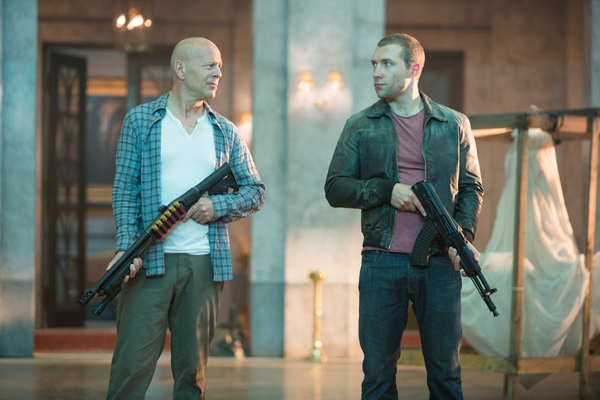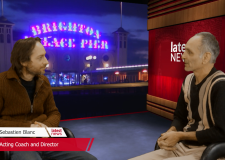Jai Courtney on playing Bruce Willis’ son in A Good Day To Die Hard

Playing the son of an icon is not easy – a lot rests on your shoulders. But it’s a peach of a part and 20th Century Fox had their pick of young actors looking to play Jack, son of New York’s most famous cop, John McClane.
Jai Courtney beat the lot. Having attended the Western Australian Academy of Performing Arts, the 26-year-old made his international breakthrough in the TV series Spartacus: Blood And Sand, before starring opposite Tom Cruise in the thriller Jack Reacher.
But his biggest challenge – in terms of audience expectations – is surely Die Hard, the action franchise that made Bruce Willis a star and has defined two decades of blowing stuff up on screen.
Courtney talks about bagging the part, working with Willis and how McClane Jr is “a chip off the old block”…
What was your reaction when you first heard about A Good Day To Die Hard?
I was pretty excited, to be honest. It was kind of a long process, getting cast. They’d been looking at some guys for a while and they’d done a round of tests and decided to go back to the drawing board. It coincided with when I’d just finished up on Jack Reacher. I was coming back through LA and my reps tried to set an audition for the role of Jack McClane, because they hadn’t found the guy. I was leaving on a plane that night, back to Australia, and I ended up having to get off the plane in order to go and test with Bruce a couple of days later. Then it was a bit of a process. It wasn’t instantaneous, it was probably about a month after that audition – I waited, went home, started another job. We’d be trading phone calls and getting updates and this and that and it came down to the point where I’d imagined it happening so many times – and then got used to the idea perhaps it wouldn’t – that when it finally came through I was just relieved. And very excited – it’s obviously a really iconic franchise and I was just thrilled. I couldn’t wait to get out there and get to work.
Is the casting process weird, because you want to commit to give it your best shot, but part of you is scared of believing it’s going to happen?
I try not to worry too much. As an actor you deal with these possibilities all the time and it is a bit of an art to try and stay in a healthy place where you can anticipate something and believe it is going to go down just the way you want it to… and then get used to the disappointment when it doesn’t work out. That’s probably a tool I’ve just had to sharpen over the last few years and get used to. I like to think that I manage quite well when it comes to shaking something off that doesn’t happen. With something like this, by that point they were so close to production that by the time I was finally cast it was absolutely a reality. Yeah, there are initial concerns about what your job is and how you fit into the whole piece and are you going to disappoint fans. With these big, iconic franchises, people have expectations and they want films to be made a certain way to please them. There are moments when you wonder about it, but it’s not exactly healthy to spend too much time focused on it. I just went out there and tried to work hard and have fun and embrace the experience. And I think the results are there. I had the pleasure of seeing the film the other day and it’s in really good shape – it’s a lot of fun and I don’t think it’s going to disappoint, that’s for sure.
When you’re auditioning are you using scenes from older movies or new material?
Usually new material or it was in this case. Some of it were scenes that ended up in the film and some were things that through the process of cutting the fat didn’t wind up in the film or we never ended up shooting. When you have a film like this the drafts kind of roll in almost constantly and some things we would write on a daily basis when we were out there. They had writers on set and some of these things just happened literally right before you’d shoot them, so we just had to improvise. But usually in the audition process its stuff from the script.
How was it meeting Bruce Willis for the first time?
It was great meeting him the first time. It was at that test I did in Los Angeles. Yeah, there’s those initial thought of “This is Bruce Willis!” You just try to be respectful. And you just run on instinct at that point and remain professional. It would probably have been a disaster had I totally got wound up and been star-struck and worrying too much about what he was thinking about me, etc, and how to try and impress this guy. It wasn’t about that. And fortunately the environment was set up as such that we were just able to get there and have fun. We were playing a few scenes from the film and I’d read the script at that point and it was just about relying on your instincts and what you know as to how to approach a scene as an actor. We had a ball. He’s lovely guy – he’s a funny guy. And I’d just come from working with Tom Cruise and I think that probably aided my ability to let go a little bit and just kind of acknowledge that we’re both actors and both professionals and here to do a job.
Presumably working on Jack Reacher would have helped with the psychical preparation – the stunt work, using firearms etc?
Definitely. That was all very fresh stepping into Die Hard. We had great weapons training on that particularly. That was not something I was very familiar with, certainly not growing up. So that was kind of an introduction to all that stuff for me. It helped immensely. Stunt work, as far as fights and that sort of thing, I’d been exposed to for sometime, because I worked on a series a few years ago called Spartacus and we’d learn fights episodically – you’d get a new series of things to follow every time we shot. So I got quite used to getting those beats down quickly and getting in tune with that choreography and what’s required and the focus and how to do things safely but also in a way that reads well to camera. That was all very helpful. I think that’s the great thing, that you kind of pick up these little learned tools along the way and apply them to your next job. It’s awesome when that happens.
Is there any particularly big set-piece we should look out for in A Good Day To Die Hard? Anything where you thought, ‘I can’t quite believe we’re doing this’?
All the time, man, all the time… There’s a car chase that is absolutely carnage for about 10 minutes and watching that back I can’t believe we did that! I would always walk onto set and see these structures they created, rooms that had been dressed up to look a certain way and it was kind of amazing to think that in three days time, when we got through the scene, we’d be blowing the whole thing up – literally! It was amusing at times and hard to believe. That’s testament to the art department and how well they do at constructing these things and making them look genuine and to the scale of this sort of production. You can’t have a Die Hard film without everything coming crashing down at some point.
Do you remember which was the first Die Hard you saw?
I think the first one I actually saw was three: Die Hard With A Vengeance. That probably goes down as one of my favorites. I think one and three are probably my favorites. That was when I was a kid and it’s one of those series of films that you just catch – it’s the sort of thing that comes on the TV and you don’t switch it off, because it’s, you know, Die Hard!
I’d seen them all growing up and then certainly, as part of my preparation, I wanted to go back and watch them all again: just kind of reaffirm to myself what it was I was getting into and also for the sheer pleasure. They’re just good, fun action films and it’s important to remember that’s what you’re making.

When you’re playing someone’s son – particularly someone as well-known as Bruce Willis – are you looking to echo certain mannerisms and things like that?
That was something I certainly thought about as part of my preparation, but I concluded that to get too worried about that would be a bit of a road block for me and I just kind of trusted the fact that the relationship we were creating within the story would be enough to support that. But then I noticed while shooting that sort of thing happened organically and it wasn’t necessarily something I was actively trying to do. There are definite things that have rubbed off on me. It’s somewhat comical watching some of the material back and seeing that transpire without it being something you were necessarily aware of at the time.
Do you do a lot of work on a backstory for your character? Did you and Bruce figure out how John and Jack had fallen out in the past, specifically what had happened, or was it more general?
It was somewhat general but I definitely had those conversations – and with John Moore [the director] as well. You need to be clear about where they stand, where their relationship stands – that’s really important and significant to where we pick this story up. So we had some pretty clear ideas about that.
We kind of meet these two guys after perhaps three years of not seeing each other and Jack has seemingly gone off the rails, but what we learn in the film is that he really took his own direction and ended up in the military and then wound up in the CIA, deep cover. And some of his antics and his disappearance were all part of establishing that cover. And there were certainly some hang-ups he had about family and about John and his relationship with his father that, I guess, aided him in running off and doing his own thing. It’s certainly important to be clear about those things.
And in terms of how John and Jack have rubbed each other up the wrong way over the years, is it because they’re so different or because they’re so similar?
Well I think it’s that classic thing of thinking they’re vastly different but really they’re very similar. I can certainly relate to that with my father. When we get into arguments it’s usually because we’re being just as stubborn as the other. That’s probably a trait that’s been handed down from him to me. So I think Jack probably thinks of himself as a very different person but he’s really just a chip off the old block.
What’s John Moore like as a director?
John’s great, man. He’s an incredibly passionate filmmaker and has really clear ideas about what he’s setting out to achieve and he’s just great. He wears his heart on his sleeve – for better or worse – and having that energy around the film set is quite inspiring, you know? We just had a lot of fun. I trusted him 100 per cent the whole way and I think he’s done a remarkable job with the film – he’s a talented dude.
Who are the villains you’re up against and what are they trying to do?
Well, basically Jack is in the middle of a sting, there’s a deal going on between some corrupt officials in the Russian government and we can track the story back to Chernobyl and some criminal dealings that happened with weapons-grade uranium. I’m trying not to give too much away, but it centres on greed and corruption and the CIA’s attempts at preventing a disastrous event that would occur as a result. And John shows up in the middle of that, trying to get me – Jack – out of trouble and in turn basically only makes matters worse! As a result the mission goes awry, deadlines aren’t met, things are shut down, it all kind of falls to pieces and Jack and John are left in the thick of it having to band together in order to bust out and stay alive.
That’s very like John McClane: to think he’s doing the right thing but end up doing the wrong thing…
Exactly, he’s always a fish out of water. This is the first time that it happens on an international stage, but it’s that classic story; kind of a bull in a china shop thing. And I think that’s where a lot of Jack’s frustration comes in, because not only has he shown up uninvited but he operates in a very different way. Jack is more methodical and tries to plan – that’s been his training and his approach to things. He’s had to rely upon that and when John shows up it’s a little bit more about winging it and seeing what happens.
So maybe Jack does a bit of his mother, a bit of Holly Gennaro, in there somewhere?
Oh, certainly, yes – there’s plenty of that in there.
Very few people have stayed at the top of their game as long as Bruce Willis has – were you looking out for things to learn from him?
Yes, you’ve got a job to do and sometimes it is like an education. You get the pleasure of just watching someone work and pick up on all sorts of things that that they’ve mastered within their craft. But sometimes you’re learning and it doesn’t necessarily feel that active – it’s just being around them and picking up on things. You are constantly learning on the job. It’s a funny thing because you do wonder what it is, what is the secret to that longevity and so much success. I think it comes down to basic things: it’s a work ethic, it’s talent, it’s instinct. And over the years of training in addition to that, through working with incredible filmmakers and directors, learning what makes sense. One of the biggest things is efficiency. These are guys that just know what they’re talking about, they know how a shot works, how a lens works, how to perform for that and that’s something that I’m certainly very green at. I find that stuff fascinating. Just seeing the confidence in a performance from some of these veterans, it’s really admirable stuff. But not necessarily so clear to jot down in your notebook and say you’re going to take that on in the next scene! For me it’s often just about observing and hoping some of that sinks in somewhere.
It must be a big thrill to find yourself in a Die Hard movie, but with this following Jack Reacher, people are going to want to label you as an action star and you’ve done Chekhov, Three Sisters, on stage before, haven’t you?
Yes, we did that with a theatre company in Sydney. I certainly don’t want to box myself into any particular genre. I think there’s always going to be strengths that you have to play to and things that will offer you maybe more opportunities than others. You deal with that from a grass roots level: I’ve always been a bigger guy and you come out of acting school and you’re going for commercials or TV and you know you’re not the guy that’s going to book the job for the lawyer or the scientist! I guess I learned early on, even on a show like Spartacus, that those sort of things are going to opportunities and it’s easier for people to see you in certain roles than others. But I really want to enjoy doing this for as long as I possibly can and for me that also means ticking lots of different boxes and exploring different characters and genres. Hopefully these couple of films that are more action-heavy will offer me the opportunity to do that and take on other stuff that interests me, not just gun-wielding types.
When you were starting out was there a distinct moment when you remember thinking, ‘I want to be an actor’?
For me taking the step into taking it seriously came from almost a lack of inspiration elsewhere! I started some work after high school in a job that I just hated and that’s sort of when it became clear that I needed to get some priorities, really. At that point all that was important to me was hanging out with my mates and playing footy and that was about as far ahead as I thought: the weekend. That was really it. So after a few months of that job, it dawned on me that I was getting pretty unhappy. And I’d always been involved in drama and acting through school and I wasn’t flexing that muscle any more or exercising it in any way and I just had this desire to chase that. I think a lot of guys in this business knew from a really young age and for me it was more of an interest than a passion, until I went and trained. It was at drama school that I really embraced it fully. When I first got there, I thought I’d made a terrible mistake and I just wasn’t cut out for it, but I started to realize that there was a place for me in this world. I was always pretty serious about having a really decent crack at it and trying to be successful as well. That was no joke as far as I was concerned. So it was when I studied that I really started to love it and was being exposed to the classics, doing Shakespeare and Chekhov and learning about crazy movement techniques and things that I wasn’t even aware of at all. I just had such a great time doing it that I knew there was nothing else I wanted to do. It’s been a funny old journey, it’s a crazy business, and it’s been a rocky road at times. I’m, in a lot of ways, just playing it by ear and trying to have as much fun while I do it.
Moving forward with this series, there’s been talk of the passing of the torch from Bruce to you. Is that something you can see happening: becoming the face of Die Hard?
I’ve had some thoughts on this and that is an idea that has been tossed around. I remember when I originally heard about them casting this role, that was kind of the pitch: “It’s the son, it’s the next generation, they’ll pass it on”. I’ve heard these things thrown around before with other franchises. Where I stand on it is kind of neutral, really. If that were to happen then of course I would be up for it, but at this point there’s nothing to sort of substantiate that. It’s a rumor as far as I’m concerned and I’ve maintained that I can’t imagine doing a Die Hard film without Bruce. I think he really is this franchise and without him it wouldn’t have been as successful as it has been. As far as handing on the torch, who knows? We’ll see. Anything is possible. Would I love to do another Die Hard film? Absolutely. In what capacity? We’ll cross that bridge when we come to it.
A Good Day To Die Hard is in cinemas Friday 15 February.
Read the preview here
Images: copyright PicSelect





















